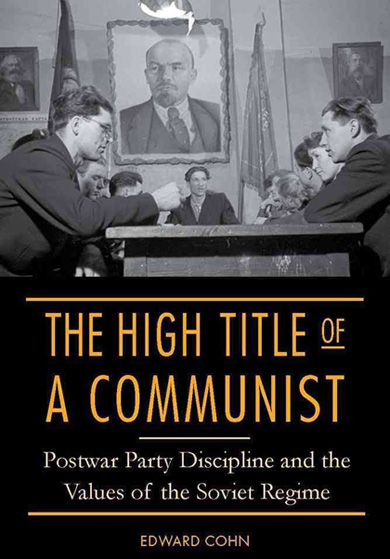
It has been roughly 25 years since the collapse of the Soviet Union; in other words, since the first experiment in the construction of socialism on a national level came to a dramatic end. But Americans’ curiosity about socialism hasn’t waned with the passage of time.
Socialism has once again become part of the mainstream political discourse – especially among youth – with the emergence of Bernie Sanders as a serious presidential contender. Additionally, more people are looking anew at the practices, policies, successes and failures of the former Soviet Union.
Edward Cohn’s The High Title Of A Communist: Postwar Party Discipline and the Values of the Soviet Regime paints a vivid picture of a Party-state seriously attempting to live up to its professed values, beliefs and moral code on the one hand, and the actual practices and flaws of its leaders – namely, communist officials – on the other.
In The High Title Of A Communist, Cohn provides a balanced, nuanced assessment of Soviet Communist Party discipline. He examines many facets of this discipline, including: communists’ war-time expectations on the front; defining ‘worthy’ and ‘unworthy’ conduct of POW’s; restoration and rehabilitation of Party activists in the post-war Stalin years; corruption and administrative misconduct; infidelity, drunkenness, labor discipline and public opinion under Khrushchev, etc.
As the Communist Party grew from a small revolutionary, underground organization into an enormous political, organizational and administrative apparatus its values and means of inter-Party discipline evolved to reflect new demographics, education and skill-sets.
In 1938, there were fewer than two million ‘Full’ and ‘Candidate’ members of the CPSU. By 1964, that number had swelled to over eleven million. Discipline in a smaller, tight-knit, underground organization was considerably different (and had a different focus) than in a large, loosely coordinated, above ground, mass organization responsible for directing and managing a national economy. By the mid-sixties, too, this was an organization nearly fifty years removed from revolution. Its needs were different and evolving. Correspondingly, its values and mechanisms of discipline were also evolving.
In 1939, the CPSU first drafted a charter defining the ‘obligations and rights’ of communists. The next version of the charter was enacted in 1952. Though much of the 1939 charter “remained in place,” according to Cohn, the total number of “obligations jumped from four to eleven; the clauses discussing these duties often referred to major postwar initiatives, including requirements that Communists ‘respect state secrets’ and ‘preserve socialist property.'”
The 1952 charter also hinted at a “critique that grew in intensity…that party organizations were becoming increasingly bureaucratic, passive, or even corrupt, and that the party discipline system had begun to treat office-holders and rank-and-file Communists in very different ways.”
That these critiques came directly from higher party institutions within the Soviet Union means that they can’t easily be dismissed simply as anti-communist misinformation born out of a Cold War capitalist context.
The charter emphasized communists “‘public duty’ that extended far beyond the workplace while helping to forge the New Soviet Person and maintaining the movement’s moral principles.” A later version of the charter went even further, “requiring Communists to conduct themselves well in private, mandating that workplace-based primary party organizations ‘see to it that each Communist observe in his own life and cultivate among workers the moral principles set forth in the CPSU program, the Moral Code of the Builder of Communism,'” which was announced at the Twenty-Second Congress in October 1961.
The ‘Moral Code of the Builder of Communism’ “functioned more as an abstract summary of regime values than as an effective, concrete ethical code…” Though vague, the Code “illustrated the party’s growing concern with personal behavior and highlighted a theme that was crucial to the vision of good behavior…the intolerance of misconduct.”
Though imperfectly executed, writes Cohn, the party discipline system “was based on the idea that Communists were leaders at home and at work whose behavior should be held to a higher standard than that of other citizens.” Resultantly, communists were “subject both to the law and to the demands of the party’s internal disciplinary system. Party membership was, after all, a privilege granted model citizens, not a right, and those Communists whose conduct damaged their authority or threatened the party’s reputation forfeited their place in the country’s political elite even when they did not break the law.”
Interestingly, the regime’s “move away from Stalinist repression actually helped to push it more deeply into the family, since informal interventions were better suited for confronting problems in a Communist’s private life,” like spousal abuse, infidelity and drunkenness, all considered “antisocial acts,” though not necessarily considered crimes by Soviet law. Therefore communists were often reprimanded and/or removed from their Party posts even though they may not have actually broken the law or been found guilty of a crime.
The High Title Of A Communist is an interesting read, focused on a largely ignored aspect of Soviet intra-Party values and discipline, namely, the sincere attempts by communists to live up to their professed values, as well as the human flaws, weaknesses and limitations of Party leaders. Cohn provides numerous case studies, highlighting individual communists – in their personal and work lives – as they struggled to live up to a higher moral code and standard, while acknowledging the collective nature of discipline.
For those interested in some of the finer nuances of CPSU governance The High Title Of A Communist is a worthwhile read.
The High Title Of A Communist: Postwar Party Discipline and the Values of the Soviet Regime
By Edward Cohn
Northern Illinois University Press, 2015, 268 pages

MOST POPULAR TODAY

High Court essentially bans demonstrations, freedom of assembly in Deep South

Zionist organizations leading campaign to stop ceasefire resolutions in D.C. area

U.S. imperialism’s ‘ironclad’ support for Israel increases fascist danger at home

UN warns that Israel is still blocking humanitarian aid to Gaza







Comments